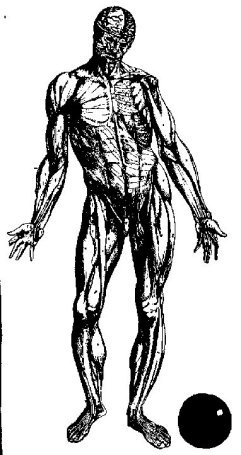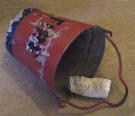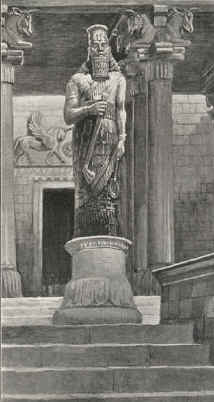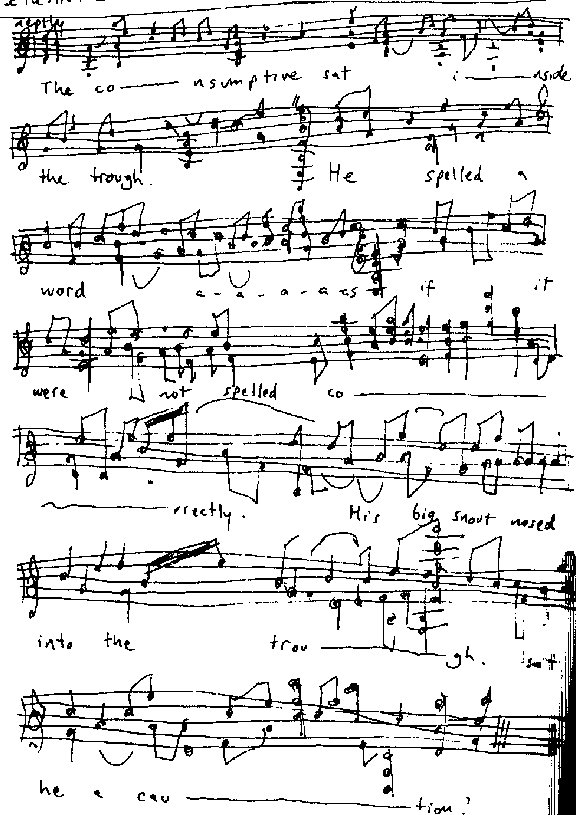Little is known of the origins of football, a game which is today one of the most popular sports throughout the Northern Lands. According to De Smet [see The Punnet, Vol XVI No.9], football began when tribal elders in the hinterland around Hoon took to mucking about after the annual ritual ostrich-battering. Thumper, on the other hand, has argued in a number of persuasive essays that the sordid practices of a family living in a cave near Bodger's Spinney were the true origins of the game. Either of these theories may be true, as might thousands upon thousands of others. But let us not tarry in the past.
The rules of football are stupendously complex. The rubric itself fills hundreds of huge volumes, and interpretative texts, analyses and commentaries have accumulated at such a rate that entire libraries are now devoted to the subject. That being the case, it is impractical in this essay to do more than sketch the merest outline. So let us draw breath, take stock, make a cup of tea, twang a ukulele, skip frolicsome thro' ling and heather, rap curses at hunched louts, sprinkle talc upon our scalps, whisk an egg, brush our teeth, impale a mothball, crack a biscuit, mumble a homily, tie a ship's knot in a necklace, stoke up the fire, spit on the coals, irk a butcher, crick our necks, stamp on a bee, shovel grit outside the police station, howl at the Wergo, mitigate a plea, fold a crocus, employ a grotesquerie and put a flea in its ear: come follow me as I expound the laws of football.
There are two teams of thirty one players each, plus a moderator, two assistant moderators, a plinth sergeant, a brazil nut attendant, and a person holding a tape measure. The teams are dubbed “Bark” and “Sap”: these terms are as arbitrary as the use of white and black to differentiate chess pieces, or the pigs and cones used in the game of lanternjaw. Each team consists of ten jack hulberts, ten cicely courtneidges, six badgers, a winch, a hurdle, a cake, a denial, and a pond. Only two badgers may be fielded at one time, unless the winch is out of play. Players may make use of bats, sticks, hooked poles, claw-hammers, lances, ballbearings, fenceposts, swords, bayonets, doorhandles, fireworks and icing sugar. At the beginning of play the moderator tosses on to the rink three balls: one is of leather, one of bladder, and one of zinc. Surprisingly, the rules say nothing about the size of the balls, and there is great variation among those commonly in use.
The object of the game is for the Bark team to puncture the leather and bladder balls beyond repair and to hide the zinc ball for a period of twenty three hours, while the Sap team must try to protect all three balls by putting them in wicker containers and keeping the opposing side away from them for an identical period. The field of play is called the pitch, rink, arena, clat, ford, or basin. It is marked out with an intricate tangle of signs and symbols and is usually waterlogged.
A true appreciation of football is hampered by the difficulty of understanding the subsidiary objectives - or “planks” — of the game. Either of the assistant moderators may impose planks at the start of the game or in the intervals between fits. There is an enormous list of planks in the rule-books from which selections may be made. A brief sample here can do no more than suggest an idea of the subtlety of thought which has developed in this aspect of football over the years. Taken literally at random, the list of planks includes the following: digging a trench across the rink; sawing off the handles of the opposing team's swords; planning, preparing, cooking, serving and eating a gala pie; synchronised palpitation; instilling an overwhelming sense of wistfulness in one's team-mates; dismantling the wicket; holding an accordion contest.
Penalties for foul play are vicious, arbitrary and senseless. Only the moderator and the plinth sergeant are permitted to impose penalties, and they must consult with each other, using an intricate system of hand signals, before the penalty can be implemented. Please do not be given the impression that there is any element of violence in the penalties. Their viciousness, arbitrariness and senselessness are of a much higher order, inconceivable to those who have not themselves played the game.
The kit, or strip, is of admirable simplicity. The Sap team appears naked, with the small concession to modesty of skin-tight, flesh-coloured tunics. (In this case, flesh-coloured means precisely what it says. The garments are dyed to the exact shade of the individual player's skin by experts retained by the Football Association.) The Bark team, on the other hand, is kitted out in voluminous clothing suitable for an Antarctic expedition - all furs, hides and swaddling, with plenty of pockets, pouches, flaps, zips, buttons, toggles, belts and buckles. As the game is played throughout the year, the Sap team has a natural advantage in the summer months, while the Bark team will tend to perform better in the biting chill of winter.
But enough of these confounded rules! As it is, they are elastic, very elastic. So much depends upon the temperament of the brazil nut attendant, in whose hands the very nature of the game can be transformed, to the extent that the rules I have so patiently explained would be unrecognisable to you, dear reader. The commentaries on the role of this official are abstruse and profound, and are deserving of years and years of study. Bagshaw and Taplow, in their invaluable tome The Brazil Nut Attendant : Retribution & Paralysis, have come closest to providing a manageable overview of the topic, although their tendency to refer to the game as “socker” is regrettable.
Before bringing this essay to a sprightly close, it will be helpful to give the reader some idea of the game's organisation, particularly in the professional sphere. The two chief administrative bodies are the Football Association and the Football League. The former is a severe and monolithic body which ensures that the rules of the game are adhered to by all parties at all times. It has a staff of over eight hundred scriveners, clerks and lackeys who work by the light of just four Tilly lamps. These saintly men and women spend their working lives issuing lengthy directives couched in a language so mesmeric that the recipients throw them at once into the dustbin without even trying to wring any sense out of them. This cavalier attitude has its repercussions, of course. From time to time, the Association sends out Special Inspectors, highly-trained gits plucked from sinks of corruption, with murder in their hearts and blackjacks in their fists. No football club visited by a Special Inspector has ever dared transgress the rules again. The Association holds an annual competition, the winning team of which is awarded the Fred Jesson Cup, named after Laura's husband in the film Brief Encounter. The cup is a model of a pollarded willow made out of battered tin. Birdhole's mighty six-volume From Custard To Wooziness provides a splendid history of the contest, and bravely addresses the more arcane aspects of the marking system, contemplation of which has led countless devotees to a sordid, drink-sodden demise.
Of the Football League, however, there is nothing remotely interesting to be said.


















